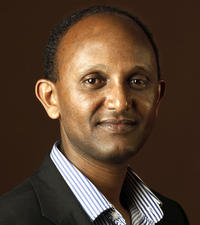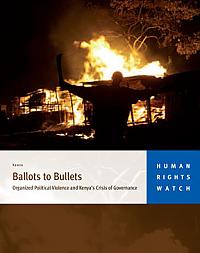By Human Rights Watch Press
Published September 9, 2013
 The International Criminal Court (ICC) trial of William Ruto, Kenya’s Deputy President from September 10, 2013 in The Hague, is an important stage in determining responsibility for post-election atrocities that brought the country to the brink of civil war.
The International Criminal Court (ICC) trial of William Ruto, Kenya’s Deputy President from September 10, 2013 in The Hague, is an important stage in determining responsibility for post-election atrocities that brought the country to the brink of civil war.
The 2007-2008 violence was sparked by alleged rigging of the presidential election. Ethnic-based killing and reprisals that often appeared to be meticulously organised, as well as police use of excessive force against protestors, killed at least 1,300 people, injured thousands more, and forced as many as 650,000 people from their homes.
“For decades those who have turned Kenya’s elections into bloodbaths have gotten away with murder,†says Daniel Bekele, Africa director at Human Rights Watch. “This ICC trial tackles an impunity crisis in the country and offers a chance for justice denied to Kenyans by their own government.”
As the Ruto trial date neared, Kenya’s National Assembly on September 5, 2013 voted to pull the country out of the court, which it joined in 2005. For Kenya to withdraw from the Rome Statute, the ICC treaty, Kenya’s government will need to notify the United Nations Secretary-General in writing. A withdrawal takes a year to go into effect. Under the terms of the treaty, however, Kenya’s obligation to cooperate in any cases pending before the date of withdrawal would remain intact.
Kenya’s Parliament also voted for withdrawal in December 2010, after the then ICC Prosecutor Luis Moreno-Ocampo, announced he would press charges, but Kenya’s then-president, Mwai Kibaki, did not act on the motion.
“Every time the ICC process inches forward, the country’s political establishment scrambles furiously to block the way,†Bekele says. “A motion by parliament calling for Kenya to withdraw from the ICC can’t stop these cases or provide an excuse for Ruto not to attend the trial.”
Ruto, who was an opposition member of parliament during the post-2007 election violence, and a co-defendant, radio broadcaster Joshua arap Sang, face crimes against humanity charges of murder, deportation or forcible transfer of population, and persecution. Ruto is accused of organising, and Sang of inciting and coordinating through his radio programme, attacks against members of the Kikuyu, Kamba, and Kisii ethnic groups, who were perceived to be supporters of the then-ruling Party of National Unity party.
The trial of Kenya’s President, Uhuru Kenyatta, in a related but separate case, is to start at the ICC in November 2013. He faces crimes against humanity charges of murder, deportation or forcible transfer of population, rape, other inhumane acts, and persecution. He is accused of enlisting a criminal gang, the Mungiki, to carry out retaliatory attack on those perceived to be supporters of the Orange Democratic Movement.
The three defendants are not subject to arrest warrants because they have to date appeared at court on every occasion requested and have pledged to continue voluntarily appearing before the ICC.
Kenyatta and Ruto have painted the ICC as a tool of Western imperialism. But Kenya’s own national Commission of Inquiry into Post-Election Violence recommended that if Kenya’s authorities failed to establish a special tribunal, the matter should be referred to the ICC as a court of last resort. After legislative efforts to set up the tribunal went nowhere, the ICC prosecutor stepped in and began investigations in 2010.
“The ICC’s cases do not cover all of the crimes committed, and not all victims will hear their stories told in court,†Bekele says. “But these cases are the first real effort to look at responsibility for the organisation and financing of the crimes.”
The burning of a church in rural Kiambaa, south of Eldoret in Kenya’s Rift Valley, was among the most horrifying scenes of post-election bloodshed that Human Rights Watch investigated in 2008. A mob set fire to a church where terrified residents had sought refuge. Approximately 30 people were burned alive.
One man told Human Rights Watch: “I saw my nephew on fire. He said, ‘uncle, uncle!’ but then he fell on his face because the petrol-soaked mattress was on his back and the fire took him.”
The Kiambaa church burning is among five incidents in the Rift Valley cited in the ICC prosecutor’s case against Ruto and Sang.
In addition to the prosecution and defense teams, a lawyer representing the victims in the ICC’s case will also make an opening statement when the trial begins.
Ruto and Kenyatta were elected in March 2013 on a joint ticket. Their government has sought to keep up an appearance of cooperation with the court as an ICC member country. But it has also sought the support of regional leaders and political bodies to end the ICC’s cases, undermining its stated commitment.
The ICC prosecutor has alleged that there has been unprecedented interference with witnesses for the case. The government has ignored threats or harassment of human rights defenders and journalists that seem to stem from their perceived association with the ICC cases. Social media campaigns have targeted groups that speak out for accountability for the 2007-2008 violence.
 The Kenyan media have actively reported on the ICC, but given the high-profile nature of the defendants, objective information about the court cases has at times been drowned out, Human Rights Watch says. In this context, it becomes all the more important for the ICC to undertake robust public information activities to ensure that Kenyans are fully informed about proceedings in The Hague.
The Kenyan media have actively reported on the ICC, but given the high-profile nature of the defendants, objective information about the court cases has at times been drowned out, Human Rights Watch says. In this context, it becomes all the more important for the ICC to undertake robust public information activities to ensure that Kenyans are fully informed about proceedings in The Hague.
“Kenyatta and Ruto ran on campaign pledges to cooperate with the ICC, but this is hardly evident from the actions of their government,” Bekele says. “As the first trial starts, the Kenyan government should make a clear public statement that it will make every effort to protect the safety of all those who seek to assist the ICC or any other justice process.”




